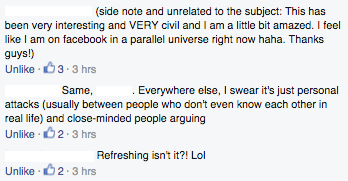This morning, I realized that I live in an era in which silencing others' opinions online means psychologically shutting people up, or making people feel uncomfortable to the point where they don't see benefit in sharing their own thoughts. The danger about this phenomenon is that it's polarizing communities, and most people don't even know they're doing it.
My Facebook news feed blew up yesterday in response to Judith Shulevitz's New York Times article critiquing "safe spaces" on college campuses. Not long after I shared the article, I stumbled upon a friend's status that claimed that progressive issues like these are "only discussed by and between white people."
As a Hispanic woman who agrees with the article and who wants to discuss campus group-think a whole lot more, this claim made my voice feel silenced, and, as a result, I felt the need to debunk this obviously false claim that only white people have an opinion about this issue. In less than 40 words, I quickly stated that I am Hispanic and that I agree with Shulevitz. In turn, I falsified the claim that was made.
Not surprisingly, I was quickly notified of defensive responses that did nothing but tell me various reasons why I was misunderstanding the article. I felt that these responses were odd, because all I was doing was explaining why the claim that only white people discuss this issue is false. And though I commented a little more, after a while, I just posted this:
Nobody told me to shut up outright, but the disproportionate number of likes on each person's comments, the sarcasm and shaming directed toward me, and the lack of empathy people had for my own personal experiences made me feel really uncomfortable sharing my opinions. Not once did someone ask me why I agreed with Shulevitz. So I asked myself a question instead:
Why did I feel silenced?
I realized that the reason I felt silenced by my peers was because there were no questions involved in our conversation. There was only telling. And defending. No one asked each other a question. Even I was guilty of that. All I did was state why someone's claim was wrong. And though it was blatantly wrong, I am still guilty of not having asked a question.
The funny thing is that right before I engaged in this conversation with friends, I engaged in another conversation on one Washington Post comment section regarding the late Kara Trippets, may she rest in peace. I'm still smiling as I write this, because this Post conversation was the best online discussion I have ever participated in or read. Here are some of the comments people left about it:
What made this conversation that I had with total strangers different from the conversation I had with the people I go to school with and see on a regular basis?
The answer is that with this one, my intention was different. After a while, I started intending to learn why these people believed what they believed. My intention wasn't to defend my own belief or to make them understand my viewpoint. I felt myself truly wanting to learn from them. And though I didn't change my mind about physician-assisted suicide, I learned about people. I read their stories. I felt their pain. It was a moment I was connected to total strangers.
It. Was. Awesome.
And all it took were some thought-provoking questions. All it took was dialogue. All it took was an intention to learn and to care.
Not everybody asked questions in return, but I think we all knew that we were genuinely interested in what each other had to say. Sure, there were people who tried to take a jab at my confidence, but these comments were meaningless in a thread that people felt comfortable and safe sharing their opinions on. The dialogue we engaged in proved to me that we don't need to silence others to get our point across and that by doing so we rob ourselves of the opportunity to connect with people on a deeper level.
This is how we should be communicating with each other on online forums. This is what I want to see more of. This can be our future. Asking questions is an act that stems from genuine interest and that shows people how much others care about what someone has to say. They do what statements can't do: They give an opportunity for others to have a voice. One thing we should all do to help ensure that our online communities are constructive and compassionate is to check our intention and ask to each other some really good questions.




